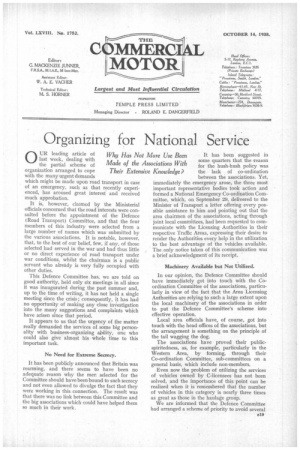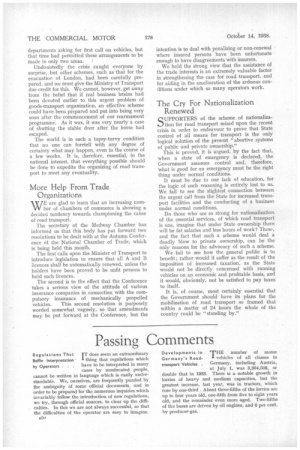Organizing for National Service O UR leading article of last week,
Page 33

Page 34

If you've noticed an error in this article please click here to report it so we can fix it.
dealing with the partial scheme of organization arranged to cope with the many urgent demands which might be made upon road transport in case of an emergency, such as that recently experienced, has aroused great interest and received much approbation.
It is, however, claimed by the Ministerial officials concerned that the road interests were consulted before the appointment of the Defence (Road Transport) Committee, and that the four members of this industry were selected from a large number of names which was submitted by the various associations. It is notable, however, that, to the best of our belief, few, if any, of those selected had served in the war and had thus little or no direct experience of road transport under war conditions, whilst the chairman is a public servant who already is very fully occupied with other duties.
This Defence Committee has, we are told on good authority, held only six meetings in all since it was inaugurated during the past summer and, up to the time of writing, it has not held a single meeting since the crisis ; consequently, it has had no opportunity of making any close investigation into the many suggestions and complaints which have arisen since that period.
It appears to us that the urgency of the matter really demanded the services of some big personality with business-organizing ability, one who could also give almost his whole time to this important task.
No Need for Extreme Secrecy.
It has been publicly announced that Britain was rearming, and there seems to have been no adequate reason why the men selected for the Committee should have been bound to such secrecy and not even allowed to divulge the fact that they were working in this connection. The result was that there was no link between this Committee and the big associations which could have helped them so much in their work. It has been suggested in some quarters that the Teason for the hush-hush policy was the lack of co-ordination between the associations. Yet, immediately the emergency arose, the three most important representative bodies took action and formed a National Emergency Co-ordination Committee, which, on September 29, delivered to the Minister of Transport a letter offering every possible assistance to him and pointing out that the area chairmen of the associations, acting through joint local committees, had been requested to communicate with the Licensing Authorities in their respective Traffic Areas, expressing their desire to render the Authorities every help in the utilization to the best advantage of the vehicles available. The only notice taken of this communication was a brief acknowledgment of its receipt.
Machinery Available but Not Utilized.
In our opinion, the Defence Committee should have immediately got into touch with the Coordination Committee of the associations, particularly in view of the fact that the Area Licensing Authorities are relying to such a large extent upon the local machinery of the associations in order to put the Defence Committee's scheme into effective operation.
Local area officials have, of course, got into touch with the head offices of the associations, but the arrangement is something on the principle of the tail wagging the dog.
The associations have proved their publicspiritedness, as, for example, particularly in the Western Area, by forming, through their Co-ordination Committee, sub-committees on a general basis, which include non-members.
Even now the problem of utilizing the services of vehicles owned by C-licensees has not been solved, and the importance of this point can be realized when it is remembered that the number of vehicles in this category is nearly three times as great as those in the haulage group.
We are informed that the Defence Committee had arranged a scheme of priority to avoid several a l9 departments asking for first call on vehicles, but that time had permitted these arrangements to be made in only two areas.
Undoubtedly the crisis caught everyone by surprise, but other schemes, such as that for the evacuation of London, had been carefully prepared, and we must give the Ministry of Transport due credit for this. We cannot, however, get away from the belief that if real business brains had been devoted earlier to this urgent problem of goods-transport organizaticn, an effective scheme could have been prepared and put into being very soon after the commencement of our rearmament programme. As it was, it was very nearly a case of shutting the stable door after the horse had escaped.
The world is in such a topsy-turvy condition that no one can foretell with any degree of certainty what may happen, even in the course of a few weeks. It is, therefore, essential, in the national interest, that everything possible should be done to expedite the organizing of road transport to meet any eventuality.
More Help From Trade Organizations
WE are glad to learn that an increasing number of chambers of commerce is showing a decided tendency towards championing the cause of road transport.
The secretary of the Medway Chamber has informed us that this body has put forward two resolutions to be dealt with at the Autumn Conference of the National Chamber of Trade, which is being held this month.
The first calls upon the Minister of Transport to introduce legislation to ensure that all A and B licences shall be automatically renewed, unless the holders have been proved to be unfit persons to hold such licences.
The second is to the effect that the Conference takes a serious view of the attitude of various insurance companies in connection with the compulsory insurance of mechanically propelled vehicles. This second resolution is purposely worded somewhat vaguely, so that amendments may be put forward at the Conference, but the intention is to deal with penalizing or non-renewal where insured persons have been unfortunate enough to have disagreements with insurers.
We hold the strong view that the assistance of the trade interests is an extremely valuable factor in strengthening the case for road transport, and for aiding in the amelioration of the arduous conditions under which so many operators work.
The Cry For Nationalization Renewed
SUPPORTERS of the scheme of nationalization for road transport seized upon the recent crisis in order to endeavour to prove that State control of all means for transport is the only logical solution of the present "abortive systems of public and private ownership." This is proved, it is argued, by the fact that,. when a state of emergency is declared, the Government assumes control and, therefore, what is good for an emergency must be the right thing under normal conditions.
It must be clue to our lack of education, for the logic of such reasoning is entirely lost to us. We fail to see the slightest connection between the urgent call from the State for increased transport facilities and the conducting of a business under normal conditions.
Do those who are so strong for nationalization of the essential services, of which road transport is one, imagine that under State ownership there will be fat salaries and less hours of work? These, and the fact that such a scheme would deal a deadly blow to private ownership, can be the only reasons for the advocacy of such a scheme.
We fail to see how the general public is to benefit ; rather would it suffer as the result of the imposition of increased taxation; as the State would not be directly concerned with running vehicles on an economic and profitable basis, and it would, obviously, not be satisfied to pay taxes to itself.
It is, of course, most certainly essential that the Government should have its plans for the mobilization of road transport so framed that within a matter of 24 hours the whole of the country could be "standing by."




























































































